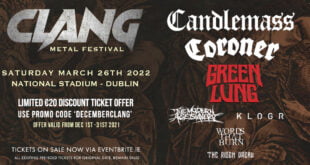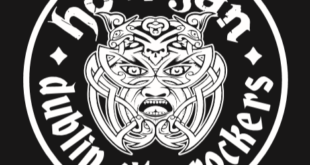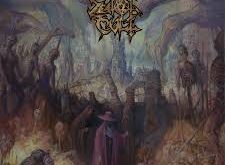 As they prepare to return north of the border in support of fellow Celts Darkest Era, and put the finishing touches to their debut full-length album, we catch up with Dubliners Celtachor to talk about ancient mythologies (and to learn a few words of Gaelic…)
As they prepare to return north of the border in support of fellow Celts Darkest Era, and put the finishing touches to their debut full-length album, we catch up with Dubliners Celtachor to talk about ancient mythologies (and to learn a few words of Gaelic…)
First of all, can you start off by introducing the band to our readers – who is in the band and how did you all come together?
Celtachor is myself, Stephen Roche on vocals and whistles, David Quinn and Fionn Stafford on guitars, Anais Chareyre on drums and Emile Quigley on bass, and we play Irish blackened folk metal inspired by and based on Irish mythology.
The idea for the band began in 2007: David and I, being the only members, wrote a few songs for a CD that was never released: but, we had it online for people to listen to and to let us know what they thought. It was only in the latter half of 2010 that Celtachor became a full working band with a full gig ready lineup, so, in some respects, we are fairly new on the gigging scene here in Ireland . At the start of 2010 we decided to go in search for members: we had Emile in on bass for a few practices, and it’s been like that ever since.
For our very first gig, on 27 August 2010, we got the chance to open for Cruachan in Dublin, for which we had Padraic Farrelly of Wound Upon Wound cover for us on drums – he also recorded our drums for our first demo ‘In The Halls Of Our Ancient Fathers’.
After the gig, Anais got in touch with us enquiring about the drummer position: needless to say, after a practice or two it was very clear that Anais was the perfect drummer for the job at hand and we started work on some new material, in the run up to starting work on the album. We decided we needed a second guitarist to expand on our sound and soon enough Fionn came on board – and things have been working better than ever since.
Everyone is on the same wavelength, and i couldn’t be more happy than with the people I now have in the band: they’re a second family really.
We’ll deal more with the influences in the band’s music in a minute, but what is the significance of the name?
The name was something of a amalgamation of two words, “Celt” and “chor” (the Irish for all). We wanted a name that would be unique to us and our style of storytelling/music and to describe all the stories of the Celt – “all of the celt” – and a name that would stick in people’s minds. I think it has done that.
Irish mythology is at the core of Celtachor: on your first CD (the aforementioned ‘In The Halls Of Our Ancient Fathers’ demo) you tackled the story of Lugh of the Long Hand, and the liner notes spoke of “tales spoken and passed down from generation to generation”. You obviously see the band as carrying on this tradition of story-telling, except through the medium of heavy metal?
This is exactly it – and the main reason and focus behind the band. It is storytelling through the medium of metal but in our own way!
We are inspired by the stories themselves, as well as the various influences that we ourselves have from black/doom/folk metal genres and our respective backgrounds. Only when we understand the particular story and saga that we are dealing with do we begin to write and come together on the song structure, etc. The upcoming debut album will be a prime example of this way of writing, and we hope many will get where we are coming from with these new compositions.
Irish mythology is the very heart of what we do… we live and breath it.
What subjects will you be tackling on your forthcoming album?
For the new album, we are taking a leap into the near future as far as the sagas are concerned, and dealing with Amergin the Druid and the landing of the Gael and what followed suit in that regard. The stories of Lugh, Nuada and Balor will make a return on a future release.
Everything we do is concept driven, and storytelling through the outlet of folk metal is the best way for us to do so. There will be a lot of various events and triumphs in the album, sorrow of course and a good amount of bloodthirsty battle: we’re looking forward to seeing what people think when the work eventually comes out. We will have updates over the coming months in the run up to its release.
How important is it to you that these ancient tales are not forgotten – and do you feel that, in telling them in a modern context, they have any parallels with what is happening in Ireland (and the world in general) today?
Well, personally, I think it is very important that these tales are not forgotten – for a number of reasons. These days, as decades pass, we are slowly losing what makes us who we are, and is important to keep our past beliefs and culture instilled into the future – even if some people see it as purely Celtic romanticism. I find nothing wrong with being proud of past beliefs and ways: why should we? It saddens me that for the vast majority it is a fairly throwaway culture – thanks to the damage that certain tourist shops have plagued upon people and visitors to Ireland: a leprachaun/shamrock/St Patrick… culture with no substance or sense!
Telling these tales in a modern context? In all honesty we don’t change much from the original stories and tales – and we definitely do not make any parallels with what is happening in Ireland – or the world. It’s not part of our message – and, certainly, the Ireland of today is a very different place indeed.
It is however great to see a much more focused interest in Irish folklore and myths, history, culture, Gaeilge, and the many areas keeping it going – and even to those who are starting from the roots up and contributing something via a sort of Celtic/Irish revival. It is very welcome and something we support one hundred percent.
You use traditional instruments such as the bodhran and whistle, both on your recordings and live: how important are these to the overall Celtachor sound?
They are very important, as with everything else that is incorporated, but they don’t overtake any of the other instruments. It all works in one flowing force to creating the atmosphere and bring the listener back to the old times and create a visual image in the mind.
I think any folk metal band that takes themselves seriously will incorporate some sort of (traditional) instrumentation into their work – and most times it will be from their own culture and country. It adds a very unique and creative edge to music and in my opinion makes it all the more interesting for it. If we can capture as much atmosphere as possible without the use of a keyboard, we will be happy!
So far, you have resisted the use of violins though…
I wouldn’t rule it out for a song or two in the future, but we definitely won’t be making it a staple of our sound. we will use more instruments in the following works, but only if and when they actually make sense to the music, the story, the saga – and not before.
So often some bands can have too much going on in their sound and sometimes things get lost in translation. But, if it’s done in a certain way, it can work wonders and sound great – (it) all depends on the musicians playing it: as they say, “too many cooks can spoil the broth”.
Scandinavian and Finnish bands have made extensive use of their respective Viking and Varangian heritages and story cycles to great effect: do you feel that their Irish counterparts have got some catching up to do, and is it Ireland’s time in this regard?
Definitely. There is a wealth of stories and legends here that need to be told and preserved in as many outlets as possible, be it through radio/film/music/theatre. A few bands here have touched on certain stories and brought them to light. They share the same ideas but we are more concept driven and more in depth: we hope that, with Celtachor, we can bring the stories to light and create music that will give a dark atmosphere and soundscape to the sagas – storytelling through the medium of folk metal music. But, things are definitely on the up and up as folk/pagan metal becomes more popular: a lot of interesting bands are coming out of the woodwork … and some that shouldn’t have started in the first place, ha ha!
The island of Ireland, as a whole, is producing some incredible music at the moment: what other bands do you admire and would recommend to a non-Irish audience looking to explore the scene here further?
Bands I would recommend would be Mael Mordha (Gaelic doom metal), Sirocco(Celtic thrash metal), Eternal Helcaraxe (Irish black metal), Corr Mhona (Irish metal, sung in Irish), Brigantia (doom metal), Thy Worshiper (Polish pagan metal currently based in Ireland), Dark Matter (instrumental), Sodb (Irish black metal), Darkest Era (Northern Irish heavy metal) – and, of course, the bigger bands from Ireland: Primordial, Mourning Beloveth and Cruachan.
Also, for anyone visiting Ireland, I’d check out the Dublin Metal Events (http://www.dublinmetalevents.com/) and Metal Ireland (http://www.metalireland.com/) sites for upcoming gigs, and check out Into The Void records in Dublin for your metal fix.
We touched briefly on the new album: what stage is it at? When can we expect it to be released? Do you have a deal?
At the moment, we are half way in the recording process: (there are) a lot of things to work on and complete, but its taking shape nicely. It will be released in the summer at some stage although there has been no release date set as yet!
If you keep a eye on our social pages on Facebook (https://www.facebook.com/celtachor), Google+, Twitter (https://twitter.com/Celtachor) and the like, we’ll be updating or spreading news from there first.
At the moment, we don’t have a deal – but we will be looking for a label after the album is out; we will be self-releasing it, and if any interested parties get in touch then we will take it from there, with any luck – but that is definitely the next plan of action!
Any webzines/magazines/radio stations that would be interested in a promotional copy of the album for review or coverage, please send an email to celtachor@hotmail.com for details.
Thanks for your time Stíofán, but before we go: can you give us a few words of Irish that no self-respecting citizen of Planet Mosh should be without?
Sláinte agus táinte (Health and wealth). Fad saol agat (Long life to you).
Seo sláinte an tséitéara, an ghadaí, an trodaí, agus an óltóra!
Má dhéanann tu séitéireacht, go ndéana tú séitéireacht ar an mbás,
Má ghoideann tú, go ngoide tú croí mná;
Má throideann tú, go dtroide tú i leith do bhráthar,
Agus má ólann tú, go n-óla tú liom féin.
(If you cheat, may you cheat death.
If you steal, may you steal a woman’s heart.
If you fight, may you fight for a brother.
And if you drink, may you drink with me)
Thanks again, Stíofán. See you at the Limelight on the 28th…
Many thanks for the interview, Mark. We’re looking forward to supporting two great bands. Let the warhorns ring!
Cheers and regards to our supporters at home and abroad and see you at a gig soon!
Keep your mythology and folklore alive! Keep the fires burning!
• Celtachor play The Limelight, Belfast, on Saturday 28 April, supporting Darkest Era and Mael Mordha. Doors are 5pm and admission is £7. For more information visit http://www.facebook.com/events/230512603698564/
 PlanetMosh Keeping it Metal
PlanetMosh Keeping it Metal


